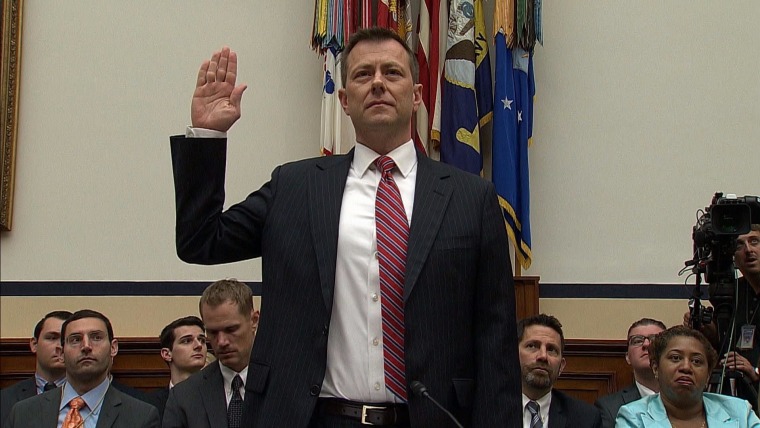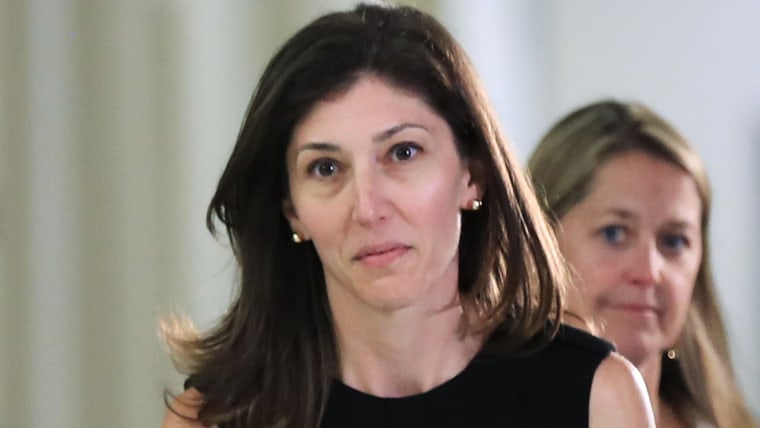WASHINGTON — He was the FBI agent so central to the Trump-Russia investigation that he came up with the code name: Crossfire Hurricane, from the lyrics of a Rolling Stones song that happened to be in his head.
And he was the same FBI agent whose anti-Trump texts on a government phone — exchanged in “intimate” conversations with an FBI lawyer who wasn’t his wife — gave President Donald Trump and his allies powerful ammunition they used in their efforts to discredit the investigation.
Now Peter Strzok, a decorated counterintelligence agent who was fired by the bureau he loved, is telling his story in a new book, “Compromised: Counterintelligence and the Threat of Donald J. Trump.”
Despite the cinematic title, Strzok reveals no new evidence that the president acted as a tool of Russia. But his insider account provides a detailed refutation of the notion that a group of anti-Trump denizens of the deep state cooked up the Russia “hoax,” as Trump likes to call it, to take down a president they didn’t support.
Watch Hallie Jackson’s interview with Strzok on “TODAY” this morning for more.
To the contrary, as he tells it, career public servants inside the FBI and the Justice Department were gobsmacked in 2016 by what they uncovered about a presidential campaign that seemed to find unlimited time to meet with Russians, practically inviting exploitation by a foreign adversary.
“I was skeptical that all the different threads amounted to anything more than bumbling incompetence, a confederacy of dunces who were too dumb to collude,” Strzok writes, summing up his view of the case for a Trump campaign conspiracy with Russia before he was removed from special counsel Robert Mueller’s investigation in July 2017 over his biased texts. “In my view, they were most likely a collection of grifters pursuing individual personal interests: their own money- and power-driven agendas.”
But he also believed, he wrote, that even if Trump didn’t formally conspire with the Russian election interference operation, the president was badly compromised. He was compromised, Strzok writes, because of his questionable business dealings, the hush money paid on his behalf to silence women, shady transactions at his charity and, most importantly, “his lies about his Russia dealings,” including his secret 2015 effort to build a Trump Tower in Moscow even as he told the world that he had no business with Russia.
“Putin knew he had lied. And Trump knew that Putin knew — a shared understanding that provided the framework for a potentially coercive relationship between the president of the United States and the leader of one of our greatest adversaries,” writes Strzok, who was deputy assistant director of the FBI’s Counterintelligence Division.
“This simple fact could explain something that made no sense otherwise: why Trump repeatedly … (chose) the course of action that made little sense in the context of U.S. national security but that clearly benefitted Russia,” he writes.
In a statement to NBC News, White House spokesman Brian Morgenstern called Strzok’s account “utter nonsense” and argued that neither Mueller nor Congress “have found any wrongdoing by the President.” He added: “Strzok is a joke, and his book isn’t worth the paper it’s printed on. “
Counterintelligence agents are tasked with rooting out foreign influence, and any such agent worth his or her salt would have been incompetent not to investigate whether Russia had leverage over a new president, Strzok writes. That’s why Strzok and his FBI colleagues took the historic step of opening a counterintelligence investigation into Trump after he fired FBI Director James Comey in May 2017 — an investigation Strzok says he earlier had opposed.
Comey’s firing also led to the appointment of Mueller, a former director of the FBI, as special counsel. Strzok, who had also played a key role in the investigation of Hillary Clinton’s emails, joined his team.
“If there was one person in the country who could determine whether I was right to be concerned, it was Robert S. Mueller III,” he writes.
But Mueller never did answer the question of whether Trump was “compromised” by Russia — he never even tried to, according to the massive report he issued describing his findings.
Mueller conducted what was purely a criminal investigation designed to determine whether crimes were committed as part of Russia’s election interference operation and to prosecute any other crimes he uncovered. Prosecute he did: 37 indictments or guilty pleas resulted from his investigation.
Of the four original subjects of Crossfire Hurricane — former campaign chairman Paul Manafort, former national security adviser Michael Flynn, former campaign aide George Papadopoulos and former campaign adviser Carter Page — two, Manafort and Papadopoulos, went to prison, and a third, Flynn, pleaded guilty and is awaiting sentencing amid a legal dispute over whether his case should be dismissed.
But none of them — and no other American — was accused of conspiring with Russia. In his report, Mueller said he couldn’t find enough evidence to bring criminal charges alleging such a conspiracy, even as he punted on the question of whether Trump obstructed justice.
Whether crimes were committed is a different question from whether Russia had a hold over the president, however. Who was supposed to answer that counterintelligence question? Who would look at whether Trump had, in fact, benefited from massive investments by Russians, as his son once said he did? Or whether there was any reason to think Putin could blackmail him?
Strzok, 50, an Army veteran who worked most of his two-decade FBI career chasing Russian spies, says it was the job of the FBI’s Counterintelligence Division. But Strzok writes that at the time he left the investigation in 2017, “we were still looking for the right way to investigate those counterintelligence concerns.”
A recent assessment by the House Intelligence Committee, which has sought classified briefings on the matter, says the FBI “has not investigated counterintelligence risks arising from President Trump’s foreign financial ties.”
Strzok said in an interview published Friday in The Atlantic that he believed the FBI’s counterintelligence inquiries into Trump “largely died on the vine,” which two people familiar with the matter confirmed to NBC News.
It’s doubtful, current and former U.S. officials say, that anyone at the FBI ever saw Trump’s tax returns or looked into whether he borrowed money from Russian oligarchs — something many Americans assumed was happening during the Mueller probe.
Was that a failure? Mueller is a revered figure among the FBI agents he once led as director, and Strzok doesn’t have a cross word to say about him. He doesn’t speak to the issue of whether Mueller, 76, a Vietnam combat veteran, was in full command of the massive investigation, a question that arose when Mueller testified before Congress and didn’t appear to be conversant with significant elements of his report.
Strzok argues that what Mueller laid out in his indictments and his report — a president who was eager and willing to accept help from the Russians, even if he didn’t conspire with them to get it — was enough to establish that Trump was compromised. But even if that’s true, it wasn’t compelling enough for House Democrats to bring impeachment charges. Trump ultimately was impeached based on his actions with regard to Ukraine, with no mention of Russia.
A bipartisan Senate Intelligence Committee report issued last month was widely seen as far more damning and detailed than the Mueller report on the question of the Trump campaign’s interactions with Russians. It also examined the counterintelligence implications of some of Trump’s relationships, delving into a possible blackmail concern around allegations that Trump strayed from his second marriage, to Marla Maples, while on a trip to Moscow in 1996.
Strzok doesn’t delve much into the limits of the Mueller report, perhaps because by the time that was playing out, his life had been turned upside down. Many of the 40,000 texts he exchanged on government phones with FBI lawyer Lisa Page, now an MSNBC legal analyst, were made public. In a court document, an FBI lawyer later highlighted that Strzok had called Trump a “disaster” in 2016 and suggested that “[w]e’ll stop” him from taking office.
The FBI fired Strzok in August 2018 after the deputy director decided that his conduct had inflicted “long term damage” on the FBI’s reputation.
Trump quickly moved to make him the bogeyman of the “Russia hoax,” and Strzok writes with outrage about what it’s like to be personally attacked more than 100 times on Twitter by the president.
At one point, Trump accused him of treason, and FBI agents had to warn Strzok that he had been on a list of targets kept by Cesar Sayoc, a Trump supporter from Florida who was arrested after he sent 14 pipe bombs to perceived political enemies.
Download the NBC News app for breaking news and politics
The conspiracy theory put forth by Trump and his allies — that a group of rogue law enforcement officials set out to frame him — is refuted in the book by Strzok’s methodical explanations of the FBI’s decisions in the face of disturbing evidence.
And Strzok writes that the conspiracy theorists have never convincingly explained why, if he and his cohorts had wanted to take Trump down at all costs, they didn’t leak the fact that the FBI was investigating through much of the 2016 election whether Trump and his aides were under the sway of a foreign adversary. Instead, the FBI took pains to make sure that that never emerged during the campaign, even as the media closely covered the Clinton email scandal. Voters went to the polls not knowing.
As for his own conduct, Strzok spends only a few lines of the book reflecting on it.
He doesn’t mention Lisa Page by name, opting not to delve into his personal life. He says he regrets having sent the texts and acknowledges having made “some terrible personal decisions” that hurt his family and the FBI.
But he also believes his firing was politically motivated and unjustified, and he is suing over it.
He points out that FBI employees frequently use their government phones for personal messages and are allowed to have private political opinions. The Justice Department’s inspector general ultimately found no evidence that political bias infected the Russia investigation, Strzok notes. The wild conspiracy theories about some of his texts were found to be baseless.
All true, but it fails to account for the damage done to the FBI’s credibility, said NBC News national security contributor Frank Figliuzzi, a former FBI counterintelligence chief.
“Strzok saw a confirmed threat and moved to investigate it,” said Figliuzzi, a vocal Trump critic. “Sadly, his valid actions have been usurped by his personal conduct and judgment, which caused some to perceive the bureau as political.
“He was fired for the damage he did to the FBI’s reputation, and rightly so.”












